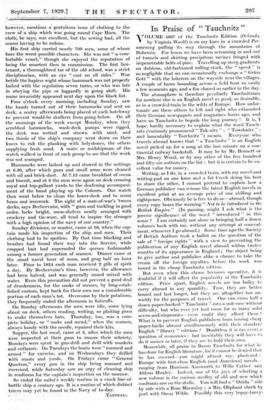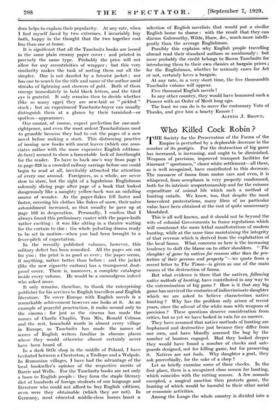In Praise of "Tauchnitz "
VOLUME 4867 of the. Tauchnitz Edition (Orlando, by Virginia Woolf) is on my knee in a crowded Per- sonenzug puffing its way through the mountains of Bohemia. For hours we have been screaming in and out of tunnels and skirting precipitous ravines fringed with impenetrable belts of pine. Travelling up steep gradients on dubious, old-fashioned rolling-stock, the " speed " is so negligible that we can occasionally exchange a " Griiss Gott " with the loiterers on the wayside near the villages. A couple of hares bounding across a field beat us easily a few moments ago, and a fox chased us earlier in the day. The atmosphere is therefore peculiarly Tauchnitzian; for nowhere else is an English novel so good, so desirable, as in a crowded train in the wilds of Europe. How unfor- tunate are these others to left and right who exhausted their German newspapers and magazines hours ago, and have no Tauchnitz to beguile the long journey ! It is, I hope, hardly necessary to explain what the word Tauch- nitz (variously pronounced " Tok-nitz " : " Towshnitz " : and lamentably " Torchnitz ") means. Everyone who travels abroad knows that " a Tauchnitz " is an English novel picked up for a song at the last minute on a con- tinental railway bookstall. It may be by Mr. Bennett or Mrs. Henry Wood, or by any other of the five hundred and fifty-six authors on the list : but it is certain to be ex- cellent value for money. Writing, as I do, in a crowded train, with my novel and writing-pad on one knee and a fat Czech doing his best to share the other, I cannot pretend to explain how a German publisher can reissue the latest English novels in excellent print at an average price of one shilling and eightpence. Obviously he is free to do so—abroad, though every copy bears the warning " Not to be introduced in the British Empire." (In passing, might I ask what is the precise significance of the word " introduced " in this sense ? I am certainly not alone in bringing half a dozen volumes back with me, without any attempt at conceal- ment, whenever I go abroad.) Some time ago the Society, of British Authors took a ballot on the question of the sale of " foreign rights " with a view to preventing the publication of any English novel abroad within twelve months of its appearance in England ; the object being to give author and publisher alike a chance to take the cream off the foreign royalties before the work was issued in the cheap Tauchnitz edition. But even when this clause becomes operative, it is doubtful if it will affect the popularity of the Tauchnitz edition. Price apart, English novels are too bulky to carry abroad in any quantity. True, they are better bound and last longer, but they are altogether too un- wieldy for the purposes of travel. One can cram half a dozen paper-backed " Tauchnitz " into a suit-case without difficulty, but who ever yet had room for as many solid seven-and-sixpennies--even could they afford them ? What is to prevent English publishers from issuing cheer, paper-backs abroad simultaneously with their standard English " library " editions ? Doubtless it is (as ever) a question of economics : but inevitably they will have to do it sooner or later, if they are to hold their own. Meanwhile, all praise to Baron Tauchnitz for what he has done for English literature, for it cannot be denied that he has covered—you might almost say, plastered— Europe with first-class English (and American) novels— ranging from Harrison Ainsworth to Willa Cather and Aldous Huxley. Indeed, one of the joys of selecting a new volume is the curious medley of old and new which confronts one on the stalls. You will find a " Ouida " side by side with a Rose Macaulay ; a Mrs. Oliphant cheek by jowl with Oscar Wilde. Possibly this very topsy-turvy- dom helps to explain their popularity. At any rate, when I find myself faced by two extremes, I invariably buy both, happy in the thought that the two together cost less than one at home.
It is significant that all the Tauchnitz books are issued in the same plain creamy paper cover : and printed in precisely the same type. Probably the price will not allow for any eccentricities of wrapper ; but this very similarity makes the task of sorting them out all the simpler. One is not dazzled by a futurist jacket ; nor has one to search for the title and name of the author amid streaks of lightning and showers of gold. Both of them emerge immediately in bold black letters, and the tired eye is grateful. It only remains then to decide whether (like so many eggs) they are new-laid or " pickled " stock ; but an experienced Tauchnitz-buyer can usually distinguish them at a glance by their tarnished—or spotless—appearance.
One cannot, of course, expect perfection for one-and- eightpence, and even the most ardent Tauchnitzians used to grumble because they had to cut the pages of a new novel before making a start. This distressing practice of issuing new books with uncut leaves (which one asso- ciates rather with the more expensive English editions- de-luxe) seemed to show a lamentable lack of forethought for the reader. To have to hack one's way from page 1 to page 323 in a crowded railway carriage before one could begin to read at all, inevitably attracted the attention of every one around. Foreigners, as a whole, are never slow to stare, but the sight of a lugubrious Englishman solemnly slicing page after page of a book that looked dangerously like a naughty yellow-back was an unfailing source of wonder. As the paper-flakes fell faster and faster, covering his clothes like flakes of snow, their naive astonishment increased, so that usually he gave up at page 102 in desperation. Personally, I confess that I always found this preliminary canter with the paper-knife rather exciting : it was like sitting in a theatre waiting for the curtain to rise : the whole pulsating drama ready to be set in motion—when you had been brought to a fever-pitch of expectation.
In the recently published volumes, however, this solitary defect has been remedied. All the pages are cut for you ; the print is as good as ever ; the paper seems, if anything, rather better than before : and the jacket (like the new cigarette cartons) has a transparent dust-- proof cover. There is, moreover, a complete catalogue inside every volume. He would be a curmudgeon indeed who asked more.
It only remains, therefore, to thank the enterprising publisher for his services to English travellers and English literature. To cover Europe with English novels is a remarkable achievement however one looks at it. As an example of peaceful penetration, it ranks second only to the cinema : for just as the cinema has made the names of Charlie Chaplin, Tom Mix, Ronald Colman and the rest, household words in almost every village in Europe, so Tauchnitz has made the names of scores of English writers familiar in obscure places where they would otherwise almost certainly never have been heard of.
In a dark little shop in the middle of Poland, I have hesitated between a Chesterton, a Trollope and a Walpole. In Rumanian villages, I have had the advantage of the local bookseller's opinion of the respective merits of Barrie and Wells. For the Tauchnitz books are not only a boon to English people : they form the staple literary diet of hundreds of foreign students of our language and literature who could not afford to buy English editions, even were they obtainable (which they are not). In Germany, most educated middle-class homes boast a selection of English novelists that would put a similar English home to shame : with the result that they can discuss Galsworthy, Wilde, Shaw, &c., much more intelli- gently than the average Englishman.
Possibly this explains why English people travelling abroad read. their standard authors so assiduously,: but more probably the credit belongs to Baron Tauchnitz for introducing them to their own classics at bargain prices ; for the Englishman, whether he seriously cares for Art or not, certainly loves a bargain.
At any rate, in a very short time, the five thousandth Tauchnitz volume will appear.
Five thousand English novels !
In any other country, they would have honoured such a Pioneer with an Order of Merit long ago.
The least we can do is to move the customary Vote of Thanks, and give him a hearty Encore ALFRED J. BROWN.

































 Previous page
Previous page